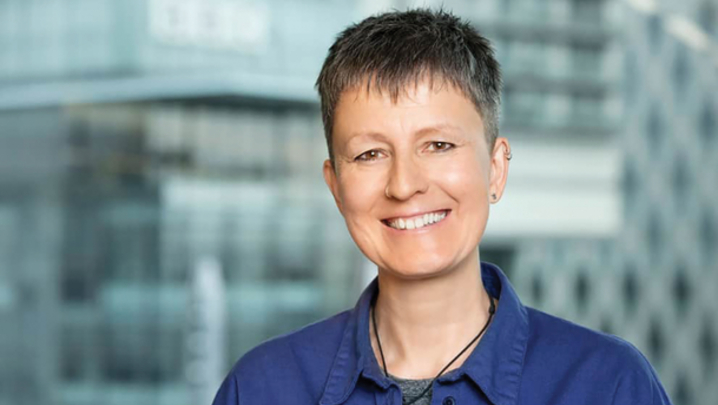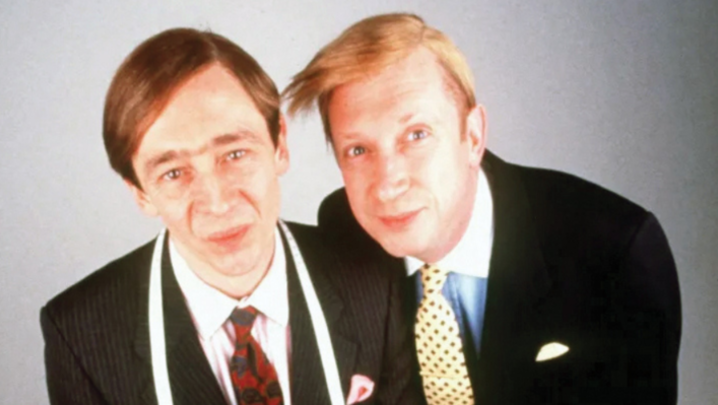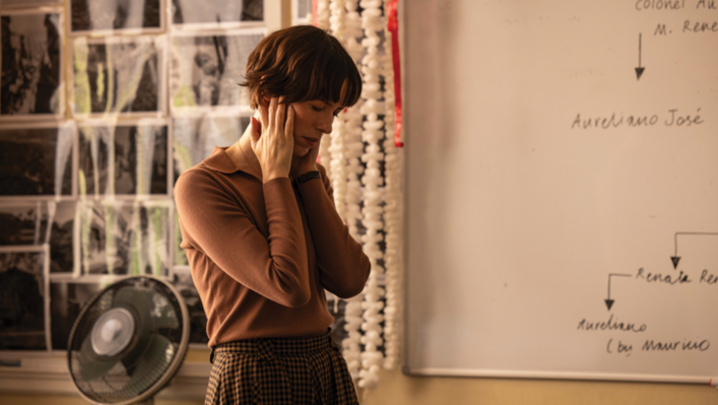Katy Boulton celebrates the Parkinson’s podcast Movers and Shakers as the kind of engaging content that helps us all to understand disability better.
I do love a good podcast. Recently I – and many thousands of others – have been drawn to a new one called Movers and Shakers. The premise is simple; six people talk about their lived experience of Parkinson’s over a few drinks down the pub.
Add to that the fact that the six comprise the legend that is Jeremy Paxman, Vicar of Dibley co-writer Paul Mayhew-Archer, former BBC technology correspondent Rory Cellan-Jones, former Working Lunch presenter Gillian Lacey-Solymar, former BBC political expert Mark Mardell and High Court judge Sir Nicholas Mostyn and you have a winning formula.
There’s a magic to the counterpoint between Paxman’s trademark mardiness and Mayhew-Archer’s sunny optimism. Paxman sees the worst in everything, saying dryly in a “What have the Romans ever done for us?” moment: “Parkinson’s has given us fuck all.” Whereas Mayhew-Archer says Parkinson’s is one of the best things that has ever happened to him: it has helped him rediscover his love of performing (he has a one-man show – Incurable Optimist – devoted to his experience of Parkinson’s), it has connected him to people whom he would never otherwise have met, and he “wouldn’t have missed it for the world”.
The six contributors had been meeting up in a pub for two years before deciding to do the podcast. They found that talking about Parkinson’s and hearing from each other about their different experiences was helpful (well, most of them did). This led to the idea for the podcast; if talking and listening provided support for them, then it could also provide light and support more widely.
In the first podcast, released in March 2023, the six talk frankly about the pain, the embarrassment, and the challenges of Parkinson’s. It becomes clear that, even among the six of them, there is a huge variety of symptoms. They highlight that the voices of people with the condition are not much heard, that others frequently speak on their behalf and that this is their chance to speak openly and honestly as people with Parkinson’s.
Lacey-Solymar sums it up when she says her aim is to “de-grimify” the condition.
And it works. Brilliantly! The podcasts (there are several in the series exploring subjects such as diagnosis, treatment, young-onset Parkinson’s) are funny, personal, illuminating and informative.
At the heart of this success is lived experience. Until fairly recently, I had not much considered the importance of this. I suppose, like many others, I felt that expertise lay mostly with, well, experts. But for the past three years, I have been working with the Bafta award-winning disabledled company TripleC.
Headed by Coronation Street’s Cherylee Houston MBE, Melissa Johns (Grantchester) and screenwriter Laurence Clark (Perfect), TripleC’s mission is to drive up the role of deaf, disabled and/or neurodivergent people in television, film and the arts.
So often, we polarise the two: experts on the one hand and lived experience on the other.
What I’ve learned from working with this amazing company is that lived experience can be an expertise in itself.
Hearing the Movers and Shakers contributors share their very different experiences of Parkinson’s matched very closely my experience of working with TripleC. I’ve learned that everyone is an expert in their own access. That doesn’t mean that, when we employ or work with disabled people, we should expect them to be the educators.
The introduction of initiatives such as the 5As – Anticipating, Asking, Assessing, Adjusting and Advocating – which is supported by all the major broadcasters, underlines the fact that we are all collectively responsible for making sure relevant access is put in place so that deaf, disabled and/or neurodivergent people can do their best work. But in doing this, we all need to remember that every individual’s expertise regarding access is the expert in their own access.
The Movers and Shakers podcast underlines that people with the same condition can have completely different symptoms and lived experience. This is true not just of Parkinson’s, but across disability more widely.
Our starting point, when asking people about their access requirements, should focus on an individual’s lived experience (and the expertise that comes with it), rather than a one-size-fits-all approach that assumes that everyone with a particular condition needs the same access implementation.
Movers and Shakers has been hugely successful. Listeners who have Parkinson’s or are family members of those with the condition write in with their experiences, adding another layer of lived experience. But the appeal is much wider, with large numbers of “neutrals” also becoming devotees.
This is illustrative of a much bigger change that we are starting to see in the television industry in terms of the inclusion of deaf, disabled and neurodivergent people.
TripleC provides access consultancy to broadcasters and production companies. Over the past few years we have supported the likes of Sex Education, The Cleaner, The A Word and many more. We help to ensure that lived experience is embedded in storylines and casting and we support productions to employ deaf, disabled and neurodivergent people in front of and behind the camera.
In his 2021 MacTaggart lecture, screenwriter and producer Jack Thorne, who is one of TripleC’s biggest supporters, challenged the industry to do better. There is still much to do, but we have seen real momentum building over the two years since Thorne threw down the gauntlet.
The Movers and Shakers podcast is one among many examples of how putting lived experience front and centre can make for fabulous content. Elsewhere we have seen Ralph & Katie (ITV Studios for BBC), Perfect (UKTV), the new CBBC drama A Kind of Spark and Chris Packham’s Inside Our Autistic Minds (BBC) and more.
Content such as this can attract big audiences, which helps to increase knowledge about neurodivergence and disability more widely. In this way, the changes in attitude we see within our industry can start to have a positive impact elsewhere. At TripleC, we call this the “penny drop” moment.
Of course, if we think deaf, disabled and/or neurodivergent people can tell only deaf, disabled and/or neurodivergent stories, we are missing the point. Inclusion goes far beyond that.
Movers and Shakers is a brilliant example of how taking lived experience as the starting point makes for excellent content that disabled and non-disabled people alike love to consume. Here’s to many more “penny drop” moments.
Katy Boulton is the strategy and operations lead at TripleC (triplec.org.uk).







